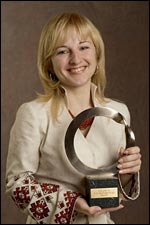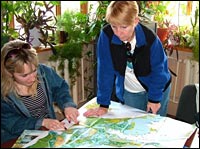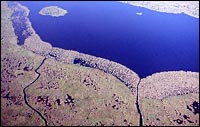Olya Melen doesn’t think small. In her first-ever court case, the young Ukrainian attorney challenged a massive canal project proposed for the Danube Delta, an internationally recognized wetland on the edge of the Black Sea. Melen, a lawyer for the public-interest group Environment-People-Law, argued that the canal would disrupt the area’s rural communities and diverse wildlife, violating national laws and international agreements.

Olya Melen.
Photo: Goldman Environmental Prize.
The court agreed with Melen, ruling in 2004 that the Ukrainian government’s environmental analysis was inadequate. But government officials pressed ahead with construction, continuing to dredge and shore up sections of the proposed canal. Not until late 2005, after the popular Orange Revolution swept President Viktor Yushchenko into office, did the government agree to a temporary halt of the project.
Yushchenko has said he wants to complete the project, which would allow shipping vessels to travel between the Danube River and the Black Sea. But Melen hopes the new government’s respect for law — and the Ukrainian people’s renewed faith in their government and court system — will help her and her allies protect the Danube Delta.
Melen, 26, was awarded one of six 2006 Goldman Environmental Prizes at a ceremony in San Francisco on April 24. She spoke to Grist from San Francisco.
Would you describe the Danube Delta and its environmental importance?

Studying a map of the Danube Delta.
Photo: John Bonine.
I have been to the delta many times, and every time it’s like an adventure to paradise. The nature there — it’s incredible, it’s like a fairy tale. There are so many birds, fish, insects, plants — it’s really exciting to go there, you really get an inspiration for your future work in nature protection. It’s important not just for Ukraine, but also for the world. It has almost the largest reed beds in the world, and it is one of the world’s largest, most beautiful, and least altered wetlands. A lot of migrating birds stay there, breed their families, and have a good time, because there are plenty of fish there. The territory was recognized as a wetland of international importance [under the Ramsar Convention], and as a World Heritage Site and Biosphere Reserve under the auspices of UNESCO.
What would happen to the delta if the proposed canal were completed?
Construction of the canal in such a magnificent area would have an adverse effect on the environment. It would cut the territory into two parts, and [if constructed as planned] it would go through the most sensitive and most valuable territory of the reserve. There are a lot of threatened species that have their spawning and breeding grounds nearby, so the noise pollution and water pollution from the canal would have negative effects on the fish, birds, and many other species that are found there.
How did you learn about the canal project, and why were you interested in it?
Three years ago the government decided to dig this canal, and the information was posted in the newspaper. We decided to take this case because the territory was very, very important for Ukraine, and for the international community. Also, it was a very negative precedent to have a very valuable natural area sacrificed to economic interests. We feared that if the government succeeded, it could result in more illegal attacks on protected areas in the future, not only in Ukraine but also all around the world.
How did you come to be the lead attorney on the case?
This case was the first big case for me — it was my first court experience, and my first court victory. I owe a lot to my colleagues and to my mentors, who had confidence in me, and who said, “You need to take this case.” First I was just coordinating the case, but now I am leading it.
You were only in your early 20s at the time, right? Were you intimidated?
I was a little bit nervous, especially the first time I went to court. Actually, I was more than nervous — my hands were shaking, my voice was breaking, and it was really scary. And my opponents were quite strong. The government of Ukraine employed a lot of lawyers who came to court all the time, too, sometimes three at a time, and they were quite aggressive.
So it was scary, but I think that being young was a good thing. Nobody expected to have a qualified opposing party in this suit. They all said, “She is so young, she knows nothing. She will not be able to convince the judge.” So I caught them by surprise. The judges didn’t take me seriously at first, but then they decided that my arguments were quite sound. Then I was taken seriously.
So what gave you the courage to stand up to these opponents?

Aerial view of the delta.
Photo: A. Vorauer.
I was very sympathetic toward nature, toward the Danube Delta. The nature there gave me a strong impetus to work further on this case. Also I liked the friendly style of family life in the delta. I wanted the people there to keep what they had, so I was also representing them in court. Also, the people in my organization who trusted me, who were confident that I would be able to do this — there was no way I could let them down. So I had to take this seriously, I had to work hard, and I had to win.
What do you think was the most powerful argument you used in court?
The most powerful argument was that the government was breaking many, many legal norms. We were trying to persuade the judges that this territory is worth being preserved for future generations, that they need to keep this territory clear and not allow the shipping canal. The number of international conventions that were violated during canal construction was really large — more than 10 conventions — and so we argued that if Ukraine dredges the canal in this area, it would have problems with the international community.
What has the Orange Revolution meant to your fight against the canal?
I think the Orange Revolution was very important, almost the turning point in our struggle. The new government seems to be more sympathetic toward the environment, and toward the establishment of the rule of law in the country. They want to keep the good faith in the international community.
Also, the Orange Revolution was very inspiring to many people. It proved that every person can make a difference, and that the government needs to respect the rights of every citizen, not just the huge group but also every citizen. And it raised the confidence of people in the court system. The Supreme Court of Ukraine played a huge role during the Orange Revolution, because they were hearing the cases on the violations during the elections. Everyone was watching the court hearings on TV from morning till afternoon, and I think [the judges’] decisions inspired more people to go to court and seek justice in front of the government.
What is your strategy for the future?
The canal project is still alive, and the new president has said that we need to complete the construction. So we want to make sure that the government makes its decisions in a sound way, in a legal way, and involves the public. The decisions need to be environmentally and scientifically sound.
What does the prize mean to you?
For me, it’s a great achievement, and it proves that I made the right choice in life when I became a public-interest environmental lawyer. I hope it will be useful for the case, and I hope that such a high recognition will eliminate all the suspicion that some members of the public had about our activity. We were accused a few times of being Romanian spies, but I hope that now those accusations will be eliminated, and people will be more environmentally concerned.


